Play video — original link
Play video
Play video
Play video
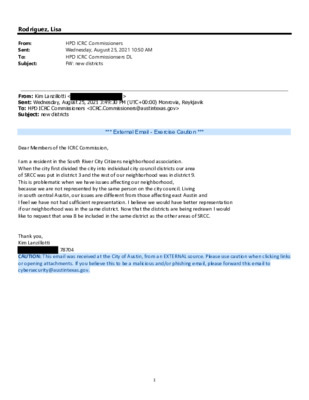
Rodriguez, Lisa From: Sent: To: Subject: HPD ICRC Commissioners Wednesday, August 25, 2021 10:50 AM HPD ICRC Commissionsers DL FW: new districts From: Kim Lanzillotti < Sent: Wednesday, August 25, 2021 3:49:30 PM (UTC+00:00) Monrovia, Reykjavik To: HPD ICRC Commissioners <ICRC.Commissioners@austintexas.gov> Subject: new districts > *** External Email - Exercise Caution *** Dear Members of the ICRC Commission, I am a resident in the South River City Citizens neighborhood association. When the city first divided the city into individual city council districts our area of SRCC was put in district 3 and the rest of our neighborhood was in district 9. This is problematic when we have issues affecting our neighborhood, because we are not represented by the same person on the city council. Living in south central Austin, our issues are different from those affecting east Austin and I feel we have not had sufficient representation. I believe we would have better representation if our neighborhood was in the same district. Now that the districts are being redrawn I would like to request that area 8 be included in the same district as the other areas of SRCC. Thank you, Kim Lanzillotti 78704 CAUTION: This email was received at the City of Austin, from an EXTERNAL source. Please use caution when clicking links or opening attachments. If you believe this to be a malicious and/or phishing email, please forward this email to cybersecurity@austintexas.gov. 1
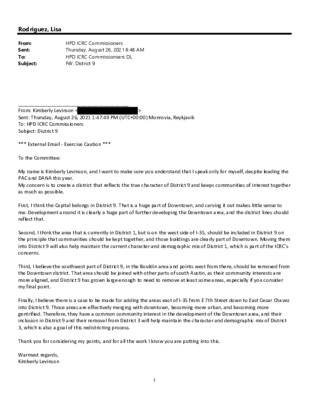
Rodriguez, Lisa From: Sent: To: Subject: HPD ICRC Commissioners Thursday, August 26, 2021 8:48 AM HPD ICRC Commissionsers DL FW: District 9 > ________________________________________ From: Kimberly Levinson < Sent: Thursday, August 26, 2021 1:47:49 PM (UTC+00:00) Monrovia, Reykjavik To: HPD ICRC Commissioners Subject: District 9 *** External Email ‐ Exercise Caution *** To the Committee: My name is Kimberly Levinson, and I want to make sure you understand that I speak only for myself, despite leading the PAC and DANA this year. My concern is to create a district that reflects the true character of District 9 and keeps communities of interest together as much as possible. First, I think the Capital belongs in District 9. That is a huge part of Downtown, and carving it out makes little sense to me. Development around it is clearly a huge part of further developing the Downtown area, and the district lines should reflect that. Second, I think the area that is currently in District 1, but is on the west side of I‐35, should be included in District 9 on the principle that communities should be kept together, and those buildings are clearly part of Downtown. Moving them into District 9 will also help maintain the current character and demographic mix of District 1, which is part of the ICRC's concerns. Third, I believe the southwest part of District 9, in the Bouldin area and points west from there, should be removed from the Downtown district. That area should be joined with other parts of south Austin, as their community interests are more aligned, and District 9 has grown large enough to need to remove at least some areas, especially if you consider my final point. Finally, I believe there is a case to be made for adding the areas east of I‐35 from E 7th Street down to East Cesar Chavez into District 9. Those areas are effectively merging with downtown, becoming more urban, and becoming more gentrified. Therefore, they have a common community interest in the development of the Downtown area, and their inclusion in District 9 and their removal from District 3 will help maintain the character and demographic mix of District 3, which is also a goal of this redistricting process. Thank you for considering my points, and for all the work I know you are putting into this. Warmest regards, Kimberly Levinson 1 CAUTION: This email …
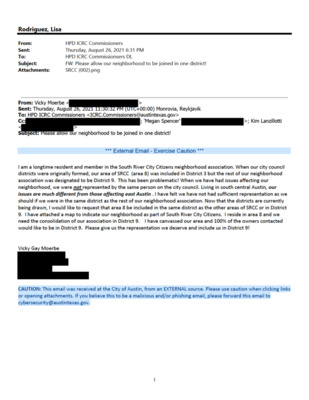
Backup
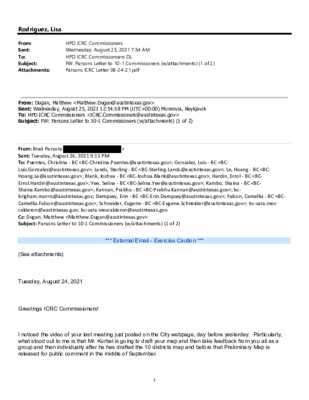
Rodriguez, Lisa From: Sent: To: Subject: Attachments: HPD ICRC Commissioners Wednesday, August 25, 2021 7:54 AM HPD ICRC Commissionsers DL FW: Parsons Letter to 10-1 Commissioners (w/attachments) (1 of 2) Parsons ICRC Letter 08-24-21.pdf From: Dugan, Matthew <Matthew.Dugan@austintexas.gov> Sent: Wednesday, August 25, 2021 12:54:18 PM (UTC+00:00) Monrovia, Reykjavik To: HPD ICRC Commissioners <ICRC.Commissioners@austintexas.gov> Subject: FW: Parsons Letter to 10-1 Commissioners (w/attachments) (1 of 2) > From: Brad Parsons Sent: Tuesday, August 24, 2021 9:15 PM To: Puentes, Christina ‐ BC <BC‐Christina.Puentes@austintexas.gov>; Gonzalez, Luis ‐ BC <BC‐ Luis.Gonzalez@austintexas.gov>; Lands, Sterling ‐ BC <BC‐Sterling.Lands@austintexas.gov>; Le, Hoang ‐ BC <BC‐ Hoang.Le@austintexas.gov>; Blank, Joshua ‐ BC <BC‐Joshua.Blank@austintexas.gov>; Hardin, Errol ‐ BC <BC‐ Errol.Hardin@austintexas.gov>; Yee, Selina ‐ BC <BC‐Selina.Yee@austintexas.gov>; Kambo, Shaina ‐ BC <BC‐ Shaina.Kambo@austintexas.gov>; Kannan, Prabhu ‐ BC <BC‐Prabhu.Kannan@austintexas.gov>; bc‐ brigham.morris@austintexas.gov; Dempsey, Erin ‐ BC <BC‐Erin.Dempsey@austintexas.gov>; Falcon, Camellia ‐ BC <BC‐ Camellia.Falcon@austintexas.gov>; Schneider, Eugene ‐ BC <BC‐Eugene.Schneider@austintexas.gov>; bc‐sara.ines‐ calderon@austintexas.gov; bc‐sara.inescalderon@austintexas.gov Cc: Dugan, Matthew <Matthew.Dugan@austintexas.gov> Subject: Parsons Letter to 10‐1 Commissioners (w/attachments) (1 of 2) *** External Email - Exercise Caution *** (See attachments) Tuesday, August 24, 2021 Greetings ICRC Commissioners! I noticed the video of your last meeting just posted on the City webpage, day before yesterday. Particularly, what stood out to me is that Mr. Korbel is going to draft your map and then take feedback from you all as a group and then individually after he has drafted the 10 districts map and before that Preliminary Map is released for public comment in the middle of September. 1 I had assumed like the last 10-1 Commission that you all would be having an open public meeting with your mapper and giving him direction on the layout of the map, as he drew it, as opposed to delegating the drafting of the 10 district map to your mapper and then give him feedback on that afterward. I had thought that you all might have watched the videos of the days when the last 10-1 Commission worked with their mapper to draw both their Preliminary map and their Final map, but just now checking, I see that the City of Austin has taken down those ATXN videos showing the mapper working with the last 10-1 Commission at AE’s Town Lake Center and One Texas Center. See: 1. http://www.austintexas.gov/edims/document.cfm?id=198360 2. http://www.austintexas.gov/edims/document.cfm?id=197729 3. http://www.austintexas.gov/edims/document.cfm?id=200533 4. http://www.austintexas.gov/edims/document.cfm?id=200802 and 5. http://www.austintexas.gov/edims/document.cfm?id=203067 . If this is to be the case, then I think you should give some detailed direction …
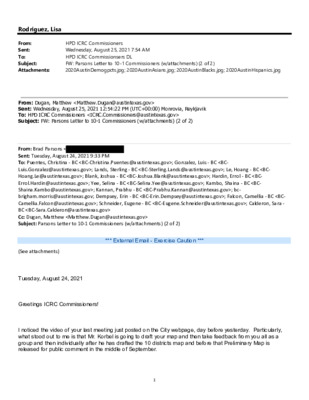
Rodriguez, Lisa From: Sent: To: Subject: Attachments: HPD ICRC Commissioners Wednesday, August 25, 2021 7:54 AM HPD ICRC Commissionsers DL FW: Parsons Letter to 10-1 Commissioners (w/attachments) (2 of 2) 2020AustinDemogpcts.jpg; 2020AustinAsians.jpg; 2020AustinBlacks.jpg; 2020AustinHispanics.jpg From: Dugan, Matthew <Matthew.Dugan@austintexas.gov> Sent: Wednesday, August 25, 2021 12:54:22 PM (UTC+00:00) Monrovia, Reykjavik To: HPD ICRC Commissioners <ICRC.Commissioners@austintexas.gov> Subject: FW: Parsons Letter to 10-1 Commissioners (w/attachments) (2 of 2) From: Brad Parsons < Sent: Tuesday, August 24, 2021 9:33 PM To: Puentes, Christina ‐ BC <BC‐Christina.Puentes@austintexas.gov>; Gonzalez, Luis ‐ BC <BC‐ Luis.Gonzalez@austintexas.gov>; Lands, Sterling ‐ BC <BC‐Sterling.Lands@austintexas.gov>; Le, Hoang ‐ BC <BC‐ Hoang.Le@austintexas.gov>; Blank, Joshua ‐ BC <BC‐Joshua.Blank@austintexas.gov>; Hardin, Errol ‐ BC <BC‐ Errol.Hardin@austintexas.gov>; Yee, Selina ‐ BC <BC‐Selina.Yee@austintexas.gov>; Kambo, Shaina ‐ BC <BC‐ Shaina.Kambo@austintexas.gov>; Kannan, Prabhu ‐ BC <BC‐Prabhu.Kannan@austintexas.gov>; bc‐ brigham.morris@austintexas.gov; Dempsey, Erin ‐ BC <BC‐Erin.Dempsey@austintexas.gov>; Falcon, Camellia ‐ BC <BC‐ Camellia.Falcon@austintexas.gov>; Schneider, Eugene ‐ BC <BC‐Eugene.Schneider@austintexas.gov>; Calderon, Sara ‐ BC <BC‐Sara.Calderon@austintexas.gov> Cc: Dugan, Matthew <Matthew.Dugan@austintexas.gov> Subject: Parsons Letter to 10‐1 Commissioners (w/attachments) (2 of 2) *** External Email - Exercise Caution *** (See attachments) Tuesday, August 24, 2021 Greetings ICRC Commissioners! I noticed the video of your last meeting just posted on the City webpage, day before yesterday. Particularly, what stood out to me is that Mr. Korbel is going to draft your map and then take feedback from you all as a group and then individually after he has drafted the 10 districts map and before that Preliminary Map is released for public comment in the middle of September. 1 I had assumed like the last 10-1 Commission that you all would be having an open public meeting with your mapper and giving him direction on the layout of the map, as he drew it, as opposed to delegating the drafting of the 10 district map to your mapper and then give him feedback on that afterward. I had thought that you all might have watched the videos of the days when the last 10-1 Commission worked with their mapper to draw both their Preliminary map and their Final map, but just now checking, I see that the City of Austin has taken down those ATXN videos showing the mapper working with the last 10-1 Commission at AE’s Town Lake Center and One Texas Center. See: 1. http://www.austintexas.gov/edims/document.cfm?id=198360 2. http://www.austintexas.gov/edims/document.cfm?id=197729 3. http://www.austintexas.gov/edims/document.cfm?id=200533 4. http://www.austintexas.gov/edims/document.cfm?id=200802 and 5. http://www.austintexas.gov/edims/document.cfm?id=203067 . If this is to be the case, then I think you should give some …
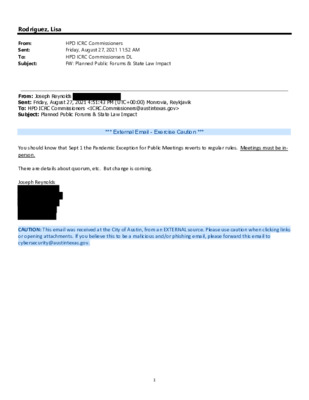
Rodriguez, Lisa From: Sent: To: Subject: HPD ICRC Commissioners Friday, August 27, 2021 11:52 AM HPD ICRC Commissionsers DL FW: Planned Public Forums & State Law Impact From: Joseph Reynolds Sent: Friday, August 27, 2021 4:51:43 PM (UTC+00:00) Monrovia, Reykjavik To: HPD ICRC Commissioners <ICRC.Commissioners@austintexas.gov> Subject: Planned Public Forums & State Law Impact *** External Email - Exercise Caution *** You should know that Sept 1 the Pandemic Exception for Public Meetings reverts to regular rules. Meetings must be in‐ person. There are details about quorum, etc. But change is coming. Joseph Reynolds CAUTION: This email was received at the City of Austin, from an EXTERNAL source. Please use caution when clicking links or opening attachments. If you believe this to be a malicious and/or phishing email, please forward this email to cybersecurity@austintexas.gov. 1
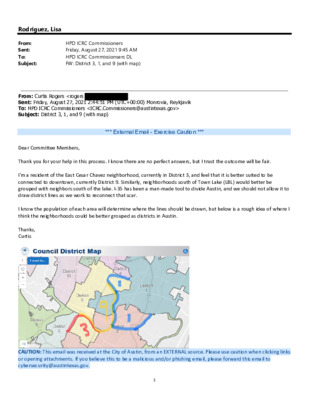
Rodriguez, Lisa From: Sent: To: Subject: HPD ICRC Commissioners Friday, August 27, 2021 9:45 AM HPD ICRC Commissionsers DL FW: District 3, 1, and 9 (with map) From: Curtis Rogers <rogers Sent: Friday, August 27, 2021 2:44:51 PM (UTC+00:00) Monrovia, Reykjavik To: HPD ICRC Commissioners <ICRC.Commissioners@austintexas.gov> Subject: District 3, 1, and 9 (with map) *** External Email - Exercise Caution *** Dear Committee Members, Thank you for your help in this process. I know there are no perfect answers, but I trust the outcome will be fair. I'm a resident of the East Cesar Chavez neighborhood, currently in District 3, and feel that it is better suited to be connected to downtown, currently District 9. Similarly, neighborhoods south of Town Lake (LBL) would better be grouped with neighbors south of the lake. I‐35 has been a man‐made tool to divide Austin, and we should not allow it to draw district lines as we work to reconnect that scar. I know the population of each area will determine where the lines should be drawn, but below is a rough idea of where I think the neighborhoods could be better grouped as districts in Austin. Thanks, Curtis CAUTION: This email was received at the City of Austin, from an EXTERNAL source. Please use caution when clicking links or opening attachments. If you believe this to be a malicious and/or phishing email, please forward this email to cybersecurity@austintexas.gov. 1
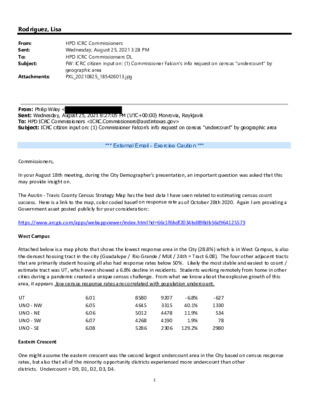
From: Sent: To: Subject: Attachments: HPD ICRC Commissioners Wednesday, August 25, 2021 3:28 PM HPD ICRC Commissionsers DL FW: ICRC citizen input on: (1) Commissioner Falcon's info request on census "undercount" by geographic area PXL_20210825_185426013.jpg Rodriguez, Lisa From: Philip Wiley < Sent: Wednesday, August 25, 2021 8:27:05 PM (UTC+00:00) Monrovia, Reykjavik To: HPD ICRC Commissioners <ICRC.Commissioners@austintexas.gov> Subject: ICRC citizen input on: (1) Commissioner Falcon's info request on census "undercount" by geographic area *** External Email - Exercise Caution *** Commissioners, In your August 18th meeting, during the City Demographer's presentation, an important question was asked that this may provide insight on. The Austin ‐ Travis County Census Strategy Map has the best data I have seen related to estimating census count success. Here is a link to the map, color coded based on response rate as of October 28th 2020. Again I am providing a Government asset posted publicly for your consideration:: https://www.arcgis.com/apps/webappviewer/index.html?id=66c1f6bdf2034bd898db56d964125573 West Campus Attached below is a map photo that shows the lowest response area in the City (28.8%) which is in West Campus, is also the densest housing tract in the city (Guadalupe / Rio Grande / MLK / 24th = Tract 6.08). The four other adjacent tracts that are primarily student housing all also had response rates below 50%. Likely the most stable and easiest to count / estimate tract was UT, which even showed a 6.8% decline in residents. Students working remotely from home in other cities during a pandemic created a unique census challenge. From what we know about the explosive growth of this area, it appears .low census response rates are correlated with population undercount. UT UNO ‐ NW UNO ‐ NE UNO ‐ SW UNO ‐ SE Eastern Crescent One might assume the eastern crescent was the second largest undercount area in the City based on census response rates, but also that all of the minority opportunity districts experienced more undercount than other districts. Undercount > D9, D1, D2, D3, D4. ‐6.8% 40.1% 11.9% 1.9% 129.2% 9207 3315 4478 4190 2306 8580 4645 5012 4268 5286 ‐627 1330 534 78 2980 6.01 6.05 6.06 6.07 6.08 1 Implications Likely ‐ some of the fastest growing parts / districts in the city also were the most undercounted. D10, which may be the slowest growing District in Austin, also had response rates >70%, >75%, >80%. Unless Districts are mapped at different sizes now, as …
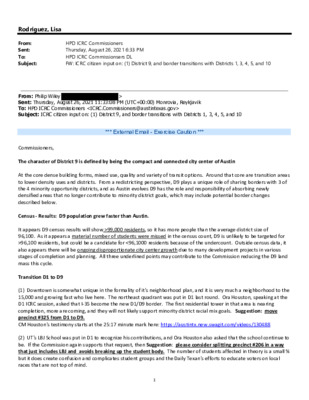
Rodriguez, Lisa From: Sent: To: Subject: HPD ICRC Commissioners Thursday, August 26, 2021 6:33 PM HPD ICRC Commissionsers DL FW: ICRC citizen input on: (1) District 9, and border transitions with Districts 1, 3, 4, 5, and 10 From: Philip Wiley Sent: Thursday, August 26, 2021 11:33:08 PM (UTC+00:00) Monrovia, Reykjavik To: HPD ICRC Commissioners <ICRC.Commissioners@austintexas.gov> Subject: ICRC citizen input on: (1) District 9, and border transitions with Districts 1, 3, 4, 5, and 10 > *** External Email - Exercise Caution *** Commissioners, The character of District 9 is defined by being the compact and connected city center of Austin At the core dense building forms, mixed use, quality and variety of transit options. Around that core are transition areas to lower density uses and districts. From a redistricting perspective, D9 plays a unique role of sharing borders with 3 of the 4 minority opportunity districts, and as Austin evolves D9 has the role and responsibility of absorbing newly densified areas that no longer contribute to minority district goals, which may include potential border changes described below. Census ‐ Results: D9 population grew faster than Austin. It appears D9 census results will show >99,000 residents, so it has more people than the average district size of 96,100. As it appears a material number of students were missed in the census count, D9 is unlikely to be targeted for >96,100 residents, but could be a candidate for <96,1000 residents because of the undercount. Outside census data, it also appears there will be ongoing disproportionate city center growth due to many development projects in various stages of completion and planning. All three underlined points may contribute to the Commission reducing the D9 land mass this cycle. Transition D1 to D9 (1) Downtown is somewhat unique in the formality of it's neighborhood plan, and it is very much a neighborhood to the 15,000 and growing fast who live here. The northeast quadrant was put in D1 last round. Ora Houston, speaking at the D1 ICRC session, asked that I‐35 become the new D1/D9 border. The first residential tower in that area is nearing completion, more are coming, and they will not likely support minority district racial mix goals. Suggestion: move precinct #325 from D1 to D9. CM Houston's testimony starts at the 25:17 minute mark here: https://austintx.new.swagit.com/videos/130488 (2) UT's LBJ School was put in D1 to recognize his contributions, and Ora Houston …
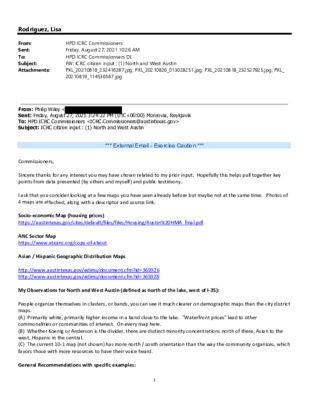
Rodriguez, Lisa From: Sent: To: Subject: Attachments: HPD ICRC Commissioners Friday, August 27, 2021 10:26 AM HPD ICRC Commissionsers DL FW: ICRC citizen input : (1) North and West Austin PXL_20210818_232416287.jpg; PXL_20210826_013028251.jpg; PXL_20210818_232527925.jpg; PXL_ 20210819_114536587.jpg From: Philip Wiley < Sent: Friday, August 27, 2021 3:24:22 PM (UTC+00:00) Monrovia, Reykjavik To: HPD ICRC Commissioners <ICRC.Commissioners@austintexas.gov> Subject: ICRC citizen input : (1) North and West Austin *** External Email - Exercise Caution *** Commissioners, Sincere thanks for any interest you may have shown related to my prior input. Hopefully this helps pull together key points from data presented (by others and myself) and public testimony.. I ask that you consider looking at a few maps you have seen already before but maybe not at the same time. Photos of 4 maps are attached, along with a descriptor and source link. Socio‐economic Map (housing prices) https://austintexas.gov/sites/default/files/files/Housing/Austin%20HMA final.pdf ANC Sector Map https://www.atxanc.org/copy‐of‐about Asian / Hispanic Geographic Distribution Maps http://www.austintexas.gov/edims/document.cfm?id=365926 http://www.austintexas.gov/edims/document.cfm?id=365928 My Observations for North and West Austin (defined as north of the lake, west of I‐35): People organize themselves in clusters, or bands, you can see it much clearer on demographic maps than the city district maps. (A) Primarily white, primarily higher income in a band close to the lake. "Waterfront prices" lead to other commonalities or communities of interest. On every map here. (B) Whether Koenig or Anderson is the divider, there are distinct minority concentrations north of there, Asian to the west, Hispanic in the central. (C) The current 10‐1 map (not shown) has more north / south orientation than the way the community organizes, which favors those with more resources to have their voice heard. General Recommendations with specific examples: 1 (D) View District 6 as the best chance at clustering people of Asian descent together. The north half of the district has a fairly large concentration, as does the north half of district 10. Recommendation: move district 326 from D10 to D6 in support of a higher Asian concentration in D6,, and evaluate other border opportunities (e.g. precincts 331, 328). You have heard people in north D10 testify they don't feel community links with 78703 = waterfront. (E) View District 10 as the waterfront district, extending out to the city's western border. As an example on the D6 / D10 shared border ‐ River Place in D6 is like asking UT and OU to share a row at a football …
Play audio
Play audio
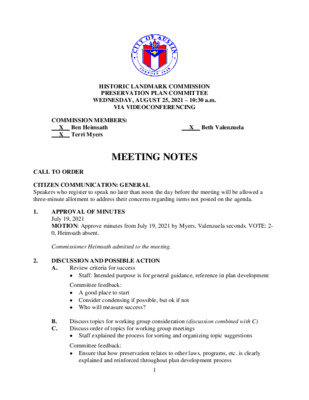
1. 2. HISTORIC LANDMARK COMMISSION PRESERVATION PLAN COMMITTEE WEDNESDAY, AUGUST 25, 2021 – 10:30 a.m. VIA VIDEOCONFERENCING COMMISSION MEMBERS: Ben Heimsath X X Terri Myers Beth Valenzuela X MEETING NOTES CALL TO ORDER CITIZEN COMMUNICATION: GENERAL Speakers who register to speak no later than noon the day before the meeting will be allowed a three-minute allotment to address their concerns regarding items not posted on the agenda. APPROVAL OF MINUTES July 19, 2021 MOTION: Approve minutes from July 19, 2021 by Myers, Valenzuela seconds. VOTE: 2- 0, Heimsath absent. Commissioner Heimsath admitted to the meeting. DISCUSSION AND POSSIBLE ACTION A. Review criteria for success • Staff: Intended purpose is for general guidance, reference in plan development B. C. Committee feedback: • A good place to start • Consider condensing if possible, but ok if not • Who will measure success? Discuss topics for working group consideration (discussion combined with C) Discuss order of topics for working group meetings • Staff explained the process for sorting and organizing topic suggestions Committee feedback: • Ensure that how preservation relates to other laws, programs, etc. is clearly explained and reinforced throughout plan development process 1 Include community involvement under partnerships topic • • Consider what’s possible in existing legal and zoning framework; also consider what would be ideal Include funding opportunities and incentives • • Expand incentives to support preservation at all levels, for all groups • Expand education • Discuss disaster preparedness (e.g., flooding, fires) • Plan draft will not include an updated preservation ordinance, but the plan will likely require updates to the ordinance to be achieved • Discuss issues of integrity for community resources • Get working group input on topics list/meeting schedule Potential briefing to Historic Landmark Commission in September • The committee agreed a briefing would be helpful D. ADJOURNMENT MOTION: Adjourn the meeting by Myers, Valenzuela seconds. VOTE: 2-0, Heimsath off the dais. The City of Austin is committed to compliance with the American with Disabilities Act. Reasonable modifications and equal access to communications will be provided upon request. Meeting locations are planned with wheelchair access. If requiring Sign Language Interpreters or alternative formats, please give notice at least 2 days (48 hours) before the meeting date. Please call the Historic Preservation Office at 512-974-1686 for additional information; TTY users route through Relay Texas at 711. For more information on the Preservation Plan Committee, please contact Cara …
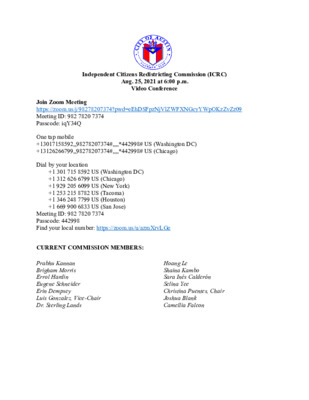
Independent Citizens Redistricting Commission (ICRC) Aug. 25, 2021 at 6:00 p.m. Video Conference Join Zoom Meeting https://zoom.us/j/98278207374?pwd=eEhDSFpzNjVlZWFXNGcyYWpOKzZvZz09 Meeting ID: 982 7820 7374 Passcode: iqY34Q One tap mobile +13017158592,,98278207374#,,,,*442998# US (Washington DC) +13126266799,,98278207374#,,,,*442998# US (Chicago) Dial by your location +1 301 715 8592 US (Washington DC) +1 312 626 6799 US (Chicago) +1 929 205 6099 US (New York) +1 253 215 8782 US (Tacoma) +1 346 248 7799 US (Houston) +1 669 900 6833 US (San Jose) Meeting ID: 982 7820 7374 Passcode: 442998 Find your local number: https://zoom.us/u/azmXrvLGe CURRENT COMMISSION MEMBERS: Prabhu Kannan Brigham Morris Errol Hardin Eugene Schneider Erin Dempsey Luis Gonzalez, Vice-Chair Dr. Sterling Lands Hoang Le Shaina Kambo Sara Inés Calderón Selina Yee Christina Puentes, Chair Joshua Blank Camellia Falcon Staff In Attendance Matthew Dugan, City's Planning Manager George Korbel, Mapping Specialist Christine Granados, ICRC Administrative Manager Members in Attendance Christina Puentes, Chair Luis Gonzalez, Vice Chair Joshua Blank Sara Inés Calderón Erin Dempsey Errol Hardin Shaina Kambo Dr. Sterling Lands Hoang Le BJ Morris Eugene Schneider Selina Yee APPROVED MINUTES Meeting Goals: Receive Information about City's Boundaries and Neighborhood Associations; Discussion on public forums and mapping process; Receive Updates from Working Groups/Subcommittees CALL TO ORDER Chair Puentes called the meeting to order at 6:03 p.m. with ten members present. Commissioner Le joined at 6:10 p.m. and Commissioner Lands joined at 6:20 p.m. CITIZEN COMMUNICATION: GENERAL The first three speakers who register to speak no later than noon the day before the meeting will be allowed a three-minute allotment to address their concerns regarding items not posted on the agenda. Peck Young addressed the commission on behalf of the NAACP and Hispanic Coalition concerning an email he sent all commissioners that stated both entities would be presenting maps at the Sept. 8, 2021 meeting. 1. APPROVAL OF MINUTES Discussion and possible action on the Aug. 18, 2021, ICRC meeting minutes. The Aug. 18, 2021 draft minutes were approved without objection 2. UNFINISHED BUSINESS The ICRC may discuss and take action on the following agenda items A. Discussion on mapping process one-on-one's with mapping specialist Korbel gave an update on the city's undercount in their maps using the 2020 Census data and how he is waiting on state numbers to make a preliminary map. He also addressed why one-on-one's with commissioners would be useful. 3. NEW BUSINESS The ICRC may discuss and take action on the following …

Item 3A. and 3B. Map of Transportation and Environmental Features https://austin.maps.arcgis.com/apps/instant/minimalist/index.html?appid=ed168b2fdb67486888b0170 30a007e09
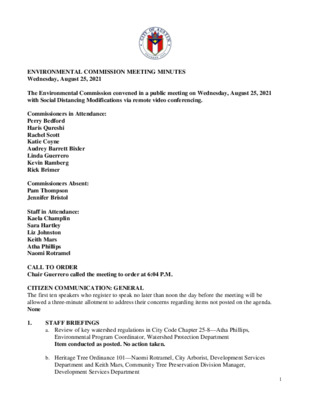
ENVIRONMENTAL COMMISSION MEETING MINUTES Wednesday, August 25, 2021 The Environmental Commission convened in a public meeting on Wednesday, August 25, 2021 with Social Distancing Modifications via remote video conferencing. Commissioners in Attendance: Perry Bedford Haris Qureshi Rachel Scott Katie Coyne Audrey Barrett Bixler Linda Guerrero Kevin Ramberg Rick Brimer Commissioners Absent: Pam Thompson Jennifer Bristol Staff in Attendance: Kaela Champlin Sara Hartley Liz Johnston Keith Mars Atha Phillips Naomi Rotramel CALL TO ORDER Chair Guerrero called the meeting to order at 6:04 P.M. CITIZEN COMMUNICATION: GENERAL The first ten speakers who register to speak no later than noon the day before the meeting will be allowed a three-minute allotment to address their concerns regarding items not posted on the agenda. None 1. STAFF BRIEFINGS a. Review of key watershed regulations in City Code Chapter 25-8—Atha Phillips, Environmental Program Coordinator, Watershed Protection Department Item conducted as posted. No action taken. b. Heritage Tree Ordinance 101—Naomi Rotramel, City Arborist, Development Services Department and Keith Mars, Community Tree Preservation Division Manager, Development Services Department 1 2. Item conducted as posted. No action taken. ITEMS FOR DISCUSSION a. Discuss returning to in-person meetings in September and pilot program for hybrid meetings Item conducted as posted. No action taken. b. Refresher on boards and commissions rules Item conducted as posted. No action taken. c. Review the purview of the Environmental Commission Item conducted as posted. No action taken. d. Discuss the Environmental Commission’s goals and objectives for the new calendar year (July 1, 2021 through June 30, 2022) Item conducted as posted. No action taken. ADJOURNMENT Chair Guerrero adjourned the meeting at 9:04 P.M. The City of Austin is committed to compliance with the American with Disabilities Act. Reasonable modifications and equal access to communications will be provided upon request. Meeting locations are planned with wheelchair access. If requiring Sign Language Interpreters or alternative formats, please give notice at least 2 days before the meeting date. Please call Kaela Champlin at Watershed Protection Department, at (512) 974-3443 for additional information; TTY users route through Relay Texas at 711. For more information on the Environmental Commission, please contact Kaela Champlin, Watershed Protection Department, at (512) 974-3443. * A member of the public may not address a board or commission at a meeting on an item posted as a briefing, per City Code Section 2-1-144(E). 2
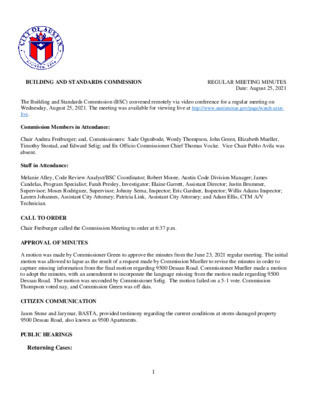
BUILDING AND STANDARDS COMMISSION REGULAR MEETING MINUTES Date: August 25, 2021 The Building and Standards Commission (BSC) convened remotely via video conference for a regular meeting on Wednesday, August 25, 2021. The meeting was available for viewing live at http://www.austintexas.gov/page/watch-atxn- live. Commission Members in Attendance: Chair Andrea Freiburger; and, Commissioners: Sade Ogunbode, Wordy Thompson, John Green, Elizabeth Mueller, Timothy Stostad, and Edward Selig; and Ex Officio Commissioner Chief Thomas Vocke. Vice Chair Pablo Avila was absent. Staff in Attendance: Melanie Alley, Code Review Analyst/BSC Coordinator; Robert Moore, Austin Code Division Manager; James Candelas, Program Specialist; Farah Presley, Investigator; Elaine Garrett, Assistant Director; Justin Brummer, Supervisor; Moses Rodriguez, Supervisor; Johnny Serna, Inspector; Eric Gardner, Inspector; Willis Adams Inspector; Lauren Johannes, Assistant City Attorney; Patricia Link, Assistant City Attorney; and Adam Ellis, CTM A/V Technician. CALL TO ORDER Chair Freiburger called the Commission Meeting to order at 6:37 p.m. APPROVAL OF MINUTES A motion was made by Commissioner Green to approve the minutes from the June 23, 2021 regular meeting. The initial motion was allowed to lapse as the result of a request made by Commission Mueller to revise the minutes in order to capture missing information from the final motion regarding 9500 Dessau Road. Commissioner Mueller made a motion to adopt the minutes, with an amendment to incorporate the language missing from the motion made regarding 9500 Dessau Road. The motion was seconded by Commissioner Selig. The motion failed on a 5-1 vote. Commission Thompson voted nay, and Commission Green was off dais. CITIZEN COMMUNICATION Jason Stone and Jarymar, BASTA, provided testimony regarding the current conditions at storm-damaged property 9500 Dessau Road, also known as 9500 Apartments. PUBLIC HEARINGS Returning Cases: 1 E. 12th Street Owner/Appellant Street Address Magnolia Christian Church William & Guisela Morrow 2215 E. Anderson Lane Service Road EB Ghassan A. Karim, LLC 6901 Wentworth Drive, Exterior; and Units A, B & D Case Number(s) 1. CL 2017-111475 The property was represented at the hearing by Mazin Sbaiti, counsel for guardian, and Paul Fletcher, counsel for Lienholder, Randolph-Brooks Federal Credit Union. Chair Freiburger admitted Exhibits 7 and 8A-8X. Commissioner Mueller moved to close the public hearing and adopt Staff’s findings of fact and conclusions of law. Commissioner Mueller also made a motion, seconded by Commissioner Green to adopt Staff’s recommended order for demolition of the primary and accessory structures within 30 days, and authorize the Code Official to …
Play audio